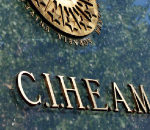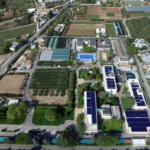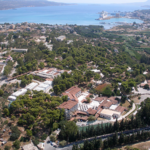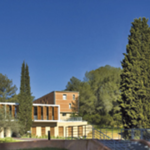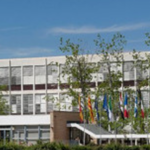Transformation des systèmes alimentaires – Processus et trajectoires en Méditerranée : Un exercice de bilan
Rapport FAO-CIHEAM-UfM
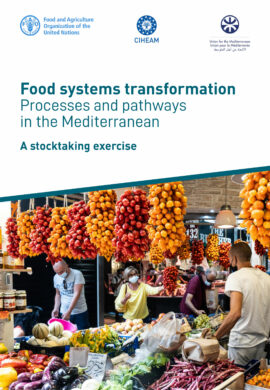
Food systems transformation- Processes and pathways in the Mediterranean- A stocktaking exerciseDownload
As in many parts of the world, food systems across the Mediterranean are not on track to deliver on food security, nutrition, and sustainability outcomes: food systems are the main drivers of environmental degradation, and they are failing to provide decent livelihoods to large parts of the population in a context of increasing disparities and the advent of climate breakdown.
These unprecedented challenges are complex and deeply interrelated, affecting the food security, health, nutrition, sustainability, and thus the livelihoods of all people across the Mediterranean. Food systems, therefore, require solutions that are systemic and dynamic, and which go beyond single disciplinary approaches to actively engage the voices of all food systems stakeholders. However, countries do have a common precious heritage, such as the Mediterranean diet, which constitutes a powerful lever for bridging food consumption and production to accelerate food systems transformation in the whole region.
Food systems are a key entry point for achieving the 2030 Agenda
Globally, food systems have been recognized as being a key entry point for achieving the ambitious goals of the 2030 Agenda for Sustainable Development. It is against this background that the United Nations Secretary-General convened the Food Systems Summit (UNFFS) on 23 September 2021 to deliver progress on all 17 Sustainable Development Goals through a food systems approach, leveraging the interconnections within food systems to address global challenges such as hunger, climate change, poverty, and inequality.
The Summit and its preparatory process have set the stage for food systems transformation across the globe, which was also reflected in the Mediterranean region. In this context, a number of Food Systems Summit Dialogues (FSSDs) were organized across the Mediterranean, allowing a broad and diverse range of stakeholders to explore the challenges faced in food systems, reflect on the Summit’s objectives, and learn from the perspective of other participants in order to make change happen.
🌍Tackling food systems transformation in the Mediterranean region
Tackling food systems transformation in the Mediterranean region requires considering sustainable food systems as a whole, rather than their separate parts, and going beyond disciplinary approaches and silos. Policy-makers have to take into consideration a web of interconnected and interdependent components within a decision-making environment concerning food systems that is very fragmented, and where there is a wide range of voices from different interest groups and agendas, with diverse institutional and agro-ecological constraints in countries and territories on all shores of the Mediterranean. Within this setting, the Food and Agriculture Organization of the United Nations (FAO), the International Center for Advanced Mediterranean Agronomic Studies (CIHEAM), and the Union for the Mediterranean (UfM) have joined forces to enhance regional dialogue and cooperation on food systems transformation in the Mediterranean through a multi-stakeholder initiative, the Sustainable Food Systems in the Mediterranean (SFS-MED) Platform. This initiative aims to foster the sense of community needed to engage countries and stakeholders across the Mediterranean, including post-Summit efforts, offering a forum for dialogue and multi-stakeholder exchange, and promoting flagship projects, investments, and regional cooperation on data sharing, science diplomacy, and innovation. As part of this effort, this publication takes stock of common challenges, priorities, and opportunities specific to the Mediterranean context, as reflected in the great number of FSSDs that took place in the region, as well as national pathways, and the statements delivered by the Member States during the Pre-Summit, the UNFSS and other related events.Areas of collaboration between regional stakeholders and next steps
The stocktaking exercise concludes by suggesting potential areas of collaboration between regional stakeholders and proposing possible next steps to move towards the implementation of pathways to transform agri-food systems. The recently developed SFS-MED Platform is also set to play a key role in assisting countries in this process. It is crucial that the momentum generated between 2020 and 2021 by the Food Systems Summit does not come to a halt. This publication is part of the follow-up process and aims to help countries and stakeholders to maximize their efforts toward food systems transformation in the Mediterranean region, ultimately accelerating progress on the delivery of the 2030 Agenda for Sustainable Development, leaving no one behind.🌍HAVE A LOOK AT THE SFSMED DIALOGUES
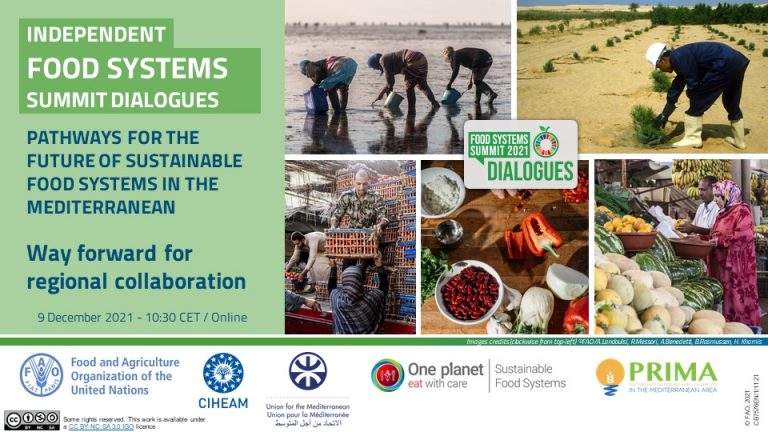


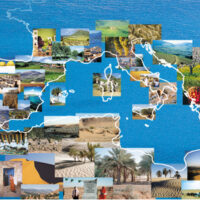 L'institut de MontpellierNotre vision est celle d’un bassin méditerranéen au sein duquel l’esprit de coopération prévaut.
L'institut de MontpellierNotre vision est celle d’un bassin méditerranéen au sein duquel l’esprit de coopération prévaut.
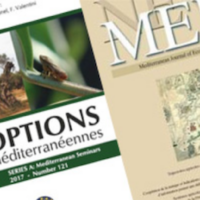 Publications du CIHEAMNos publications et outils de communication visent à faciliter les processus de prise de décision pour les acteurs politiques, économiques et agricoles de la région méditerranéenne.
Publications du CIHEAMNos publications et outils de communication visent à faciliter les processus de prise de décision pour les acteurs politiques, économiques et agricoles de la région méditerranéenne. Actualités et événements
Actualités et événements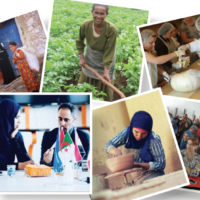 Revue de presse (Scoop.it)
Revue de presse (Scoop.it) Programmes de MasterLe CIHEAM Montpellier c’est à la fois un accompagnement personnalisé et une ouverture à l’international.
Programmes de MasterLe CIHEAM Montpellier c’est à la fois un accompagnement personnalisé et une ouverture à l’international.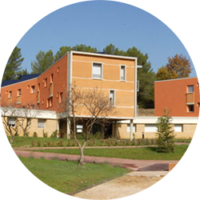 Campus & vie étudianteDepuis 1962 nous accueillons près de 95% d’étudiants internationaux.
Campus & vie étudianteDepuis 1962 nous accueillons près de 95% d’étudiants internationaux.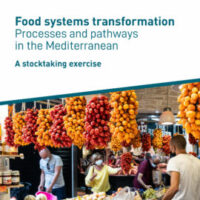
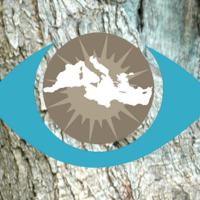 Portail documentaireUn Centre de documentation unique sur la Méditerranée,
investi dans le partage des connaissances.
Portail documentaireUn Centre de documentation unique sur la Méditerranée,
investi dans le partage des connaissances.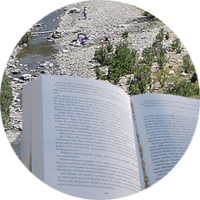 Production scientifiqueLa politique des publications du CIHEAM est depuis longtemps engagée dans le mouvement du libre accès et du partage des connaissances.
Production scientifiqueLa politique des publications du CIHEAM est depuis longtemps engagée dans le mouvement du libre accès et du partage des connaissances. Devenir partenairesTisser des partenariats fait partie de l’ADN du CIHEAM Montpellier... Rejoignez ses projets ou ses formations, soutenez ses actions.
Devenir partenairesTisser des partenariats fait partie de l’ADN du CIHEAM Montpellier... Rejoignez ses projets ou ses formations, soutenez ses actions.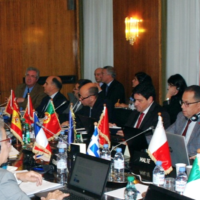 Réunions ministériellesA travers les Ministérielles , le CIHEAM contribue à la construction d'un dialogue entre les pays méditerranéens autour des questions relatives à l'agriculture et au monde rural.
Réunions ministériellesA travers les Ministérielles , le CIHEAM contribue à la construction d'un dialogue entre les pays méditerranéens autour des questions relatives à l'agriculture et au monde rural.